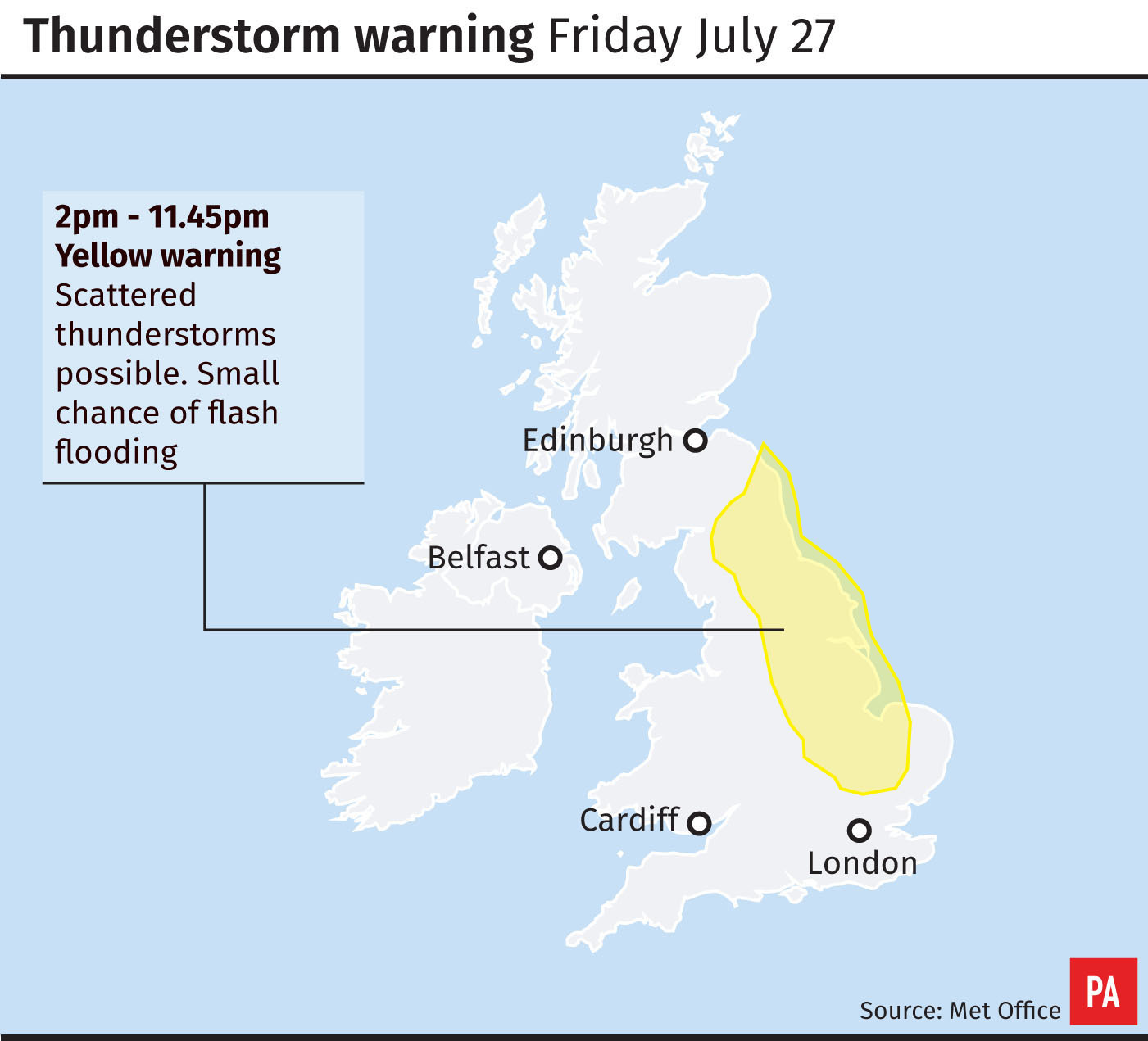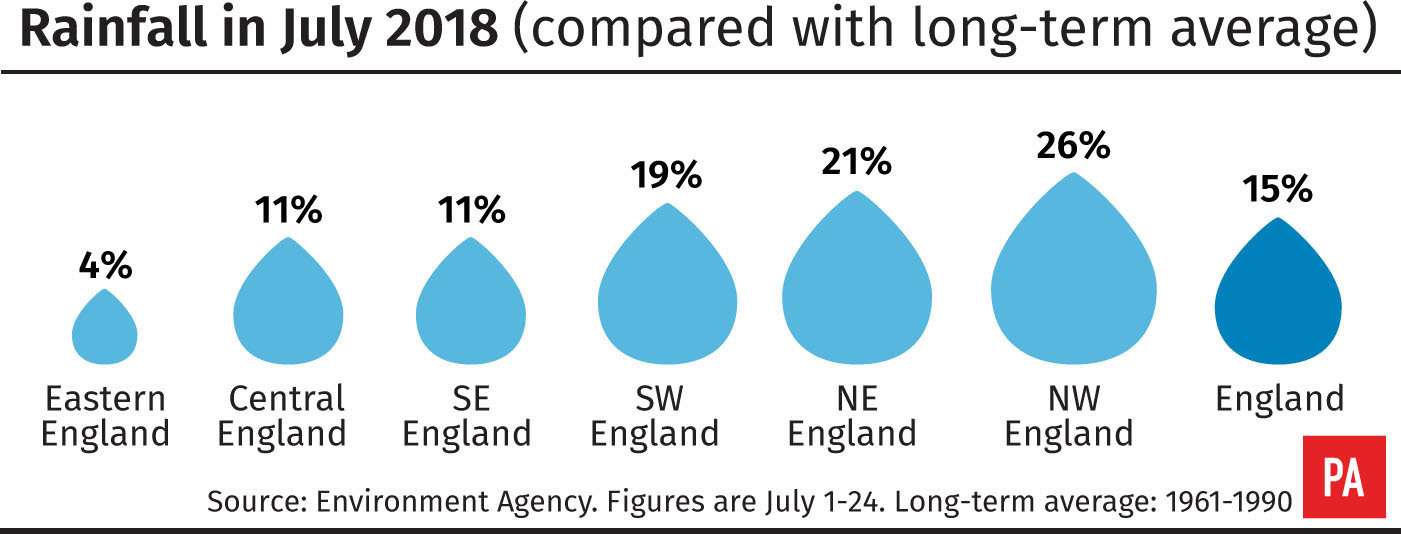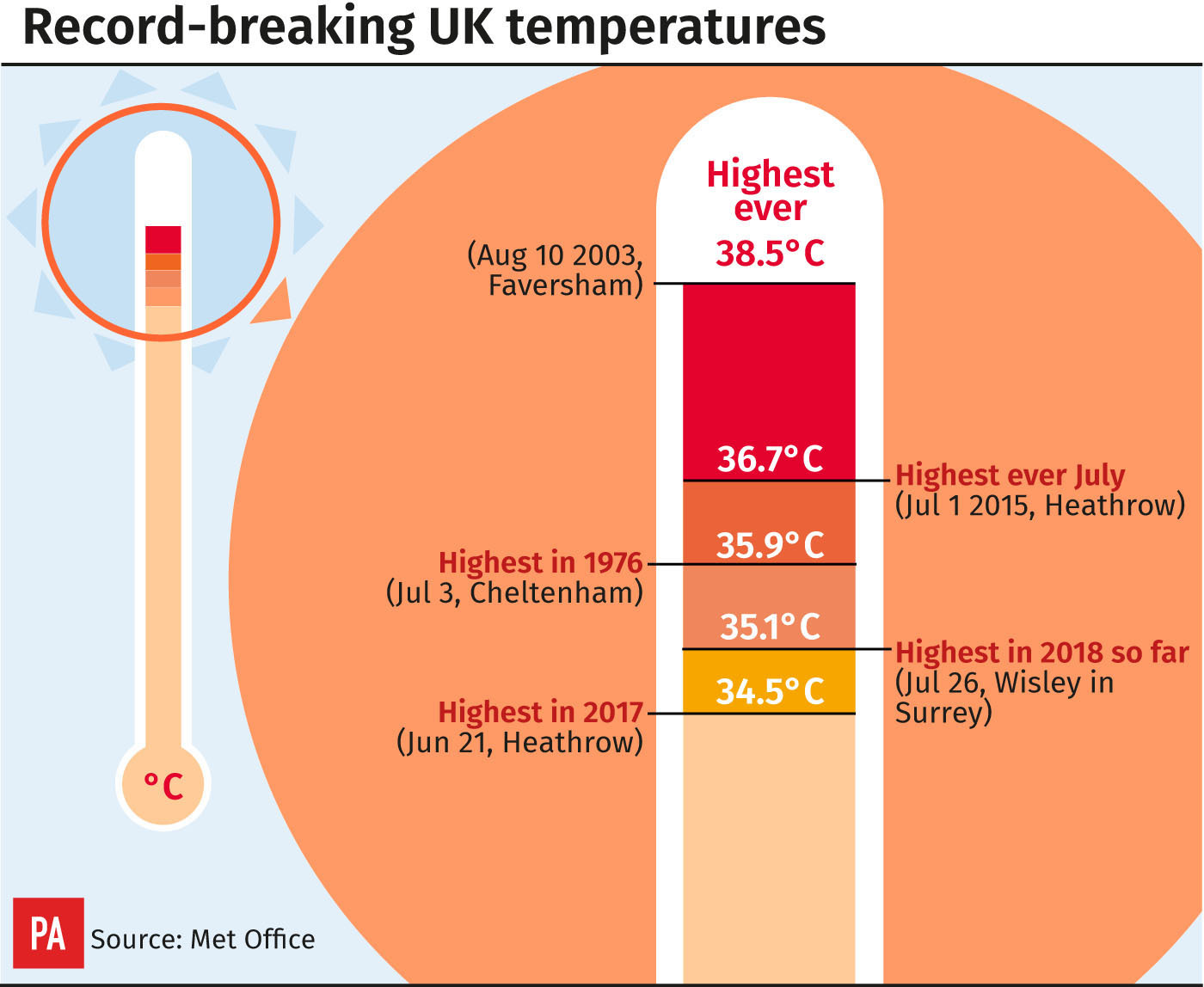
Heavy thunderstorms could cause danger to life, sudden flooding and power cuts as forecasters upgraded a weather warning.
The Met Office issued an amber alert for parts of England – a step up from yellow – with intense storms looking set to bring the British heatwave to an end.
Thursday saw the highest temperature recorded in the UK since 2015, with Wisley in Surrey hitting 35.1C (95.2F), and the mercury could still soar to a stifling 37C (98.6F) on Friday.
The hot weather and very high afternoon temperatures have led to an amber warning for thunderstorms valid from 2pm to 8pm in the East Midlands and East of England on Friday.

Torrential downpours are possible, with as much as 30mm of rainfall in one hour and 60mm in three hours, while large hail, frequent lightning and strong, gusty winds will be additional hazards, forecasters warned.
The yellow warning for thunderstorms is in place until 2am on Saturday and covers London and the East of England.
Those in the areas covered by the warnings can expect flooding of homes and businesses, which could happen quickly, with damage to some buildings from floodwater.
“Fast flowing or deep floodwater is likely, causing danger to life,” the Met Office said of the areas covered by the amber warning.
Delays or cancellations on transport, difficult driving conditions and power cuts are also possibilities.
Yellow warnings for rain have also been issued for Northern Ireland on Saturday, with thunder possible.
An amber severe weather warning for #thunderstorms has been issued: https://t.co/QgldaA07QR Stay #weatheraware @metofficeUK pic.twitter.com/im3arN9Pnf
— Met Office (@metoffice) July 27, 2018
Will Lang, chief meteorologist at the Met Office, said temperature records could still be broken.
“If conditions all come together, there’s a 50% chance that we will break the July record temperature and a 20% chance of a new all-time UK record high,” he said.
A temperature of 36.7C (98F) at Heathrow on July 1 2015 is currently the record for the month of July, while the all-time record in the UK is 38.5C (101.3F) at Faversham on August 10 2003.
Tony Wafer, RNLI community safety manager, said: “If you are heading to the coast this weekend, please find out where your nearest lifeguarded beach is and ask the lifeguards for advice on conditions, especially if you are going in the water.
“RNLI lifeboats and lifeguards have had four times as many rescues of inflatables so far this summer than they did last year.”

Meanwhile, police forces have been called following concerns for people’s welfare at rivers and a lake.
Thames Valley Police said a man’s body was recovered from the Jubilee River in Slough, adding that his death is not being treated as suspicious.
Warwickshire Police said emergency services personnel searching for a 17-year-old boy who disappeared after getting into difficulty in a quarry lake in Bishops Itchington, near Leamington Spa, have recovered a body.
We are sad report police searching the Blue Lagoon quarry area of Bishop’s Itchington have recovered a body. Please see below for the latest update from Inspector Rupert Atkinson: https://t.co/5NabayFb0k pic.twitter.com/rxztEDSq6b
— Warwickshire Police (@warkspolice) July 27, 2018
Essex Police said the search for a boy who was last seen in water near Clacton Pier on Thursday evening resumed on Friday morning.
The force was called amid concerns for the welfare of two teenagers and was on the scene just after 6.35pm.
One boy was rescued by a lifeboat crew, checked over by medical teams and reunited with his family, but the second, aged 13, remains unaccounted for.
Elsewhere, cross-Channel rail operator Eurotunnel has cancelled thousands of tickets after “extreme temperatures” caused major disruption to services.
Passenger Service Update: customers travelling from Folkestone are experiencing 1h30 delay Pre Check-in and 1h30 wait on our Terminal. This is due to the unprecedented high temperatures are affecting the operation of air conditioning on our shuttles resulting in long delays.^FF
— Eurotunnel Le Shuttle (@LeShuttle) July 27, 2018
It is one of the busiest weeks of the year for cross-Channel travel as the start of many school summer holidays leads to a surge in family trips.
The company took the “unprecedented decision” to stop passengers travelling on Friday if they were due to return on the same day or Saturday in a bid to ease long queues.
On UK trains, passengers were urged to avoid travelling on London North Eastern Railway (LNER) on Friday after lightning damaged the signalling system.
Train firm Northern advised passengers not to travel in the Yorkshire area due to the same issue.

On the roads, motorists were warned of lightning, flash flooding and large hailstones, with a thunderstorm warning in place for Friday afternoon until just before midnight.
A mix of toxic air, extreme highs, emissions from the continent and a lack of cloud cover caused a “high” air pollution alert to be issued for London.
Elsewhere, authorities said the heatwave was causing “winter conditions” in parts of the NHS, while many nurses were said to be dizzy and exhausted.
Caroline Douglass, flood duty manager for the Environment Agency, said: “We’re expecting thunderstorms and heavy downpours across parts of the East of England on Friday, which could lead to surface water flooding, particularly in built-up areas.
“Parts of East Anglia and Lincolnshire could see the most intense rainfall.
“Following the recent dry weather, heavy rainfall on dry or compacted ground may run off quickly, causing river levels to rise rapidly and bringing a risk of localised flooding.”


Comments: Our rules
We want our comments to be a lively and valuable part of our community - a place where readers can debate and engage with the most important local issues. The ability to comment on our stories is a privilege, not a right, however, and that privilege may be withdrawn if it is abused or misused.
Please report any comments that break our rules.
Read the rules hereLast Updated:
Report this comment Cancel